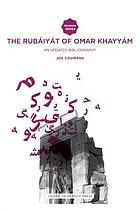Balkan Rubaiyat. The post-Ottoman polysystem between East and West. R. Mueller.
Paper, online available at Academia.edu, June 2014.
In the Balkans, two important national thinkers produced their own Rubaiyat translations. In 1920, Safvet-Beg Bašağić (1870-1934), Oriental scholar and father of Muslim nationalism in Bosnia, published the first translation of the acclaimed Rubaiyat in a South Slavic language. In 1926, Theofan Stylian Noli (1882-1965), ordained Orthodox priest, national intellectual and once-Prime Minister of Albania, published the first Albanian-language version of the Rubaiyat. What are we to make of the temporal and geographical convergence of these individuals and their text, their parallel projects of making a behemoth of modern world literature—itself situated in an unstable place between East and West—available to audiences in a newly post-Ottoman sphere?
